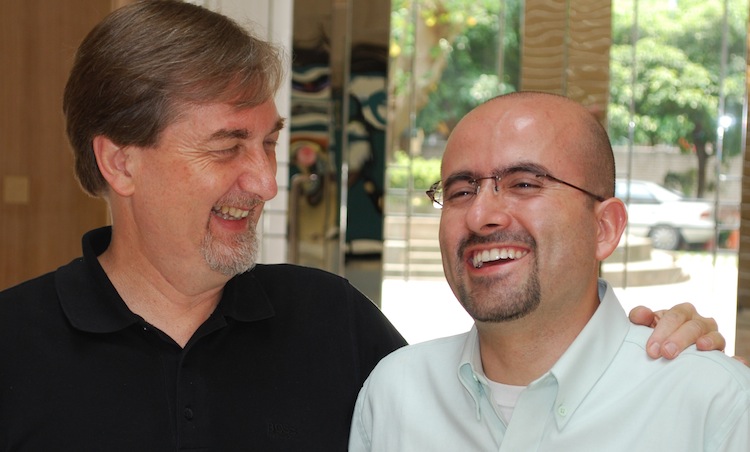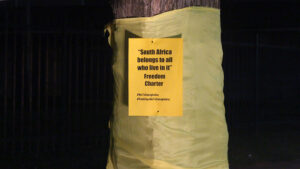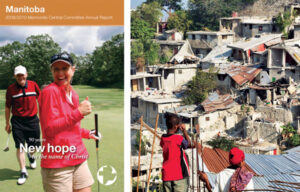The rise of Anabaptist-related churches in the global South is becoming much more than a matter of membership. At this year’s meeting of the Mennonite World Conference’s Executive Committee, May 4-10, actions on staffing and structures also reflected that growth.
Setting the tone for the gathering was the May 4 appointment of César García of Colombia as General Secretary-elect, to take over the role from Larry Miller on January 1, 2012. The decision includes the relocation of MWC’s head office from Strasbourg, France, to Bogotá, Colombia.
“We are opening a new chapter in Mennonite World Conference history, now that we have found César,” said MWC President Danisa Ndlovu following the meetings. “Now it is critical that during his time of orientation that he be received and embraced by the various MWC communities.”
The appointment of García, who currently serves as secretary of MWC’s Mission Commission, also fulfills a dream of current General Secretary Larry Miller. “It is the culmination of a long march toward leadership from the global South,” he said. “It’s a key position for shaping the direction of MWC and the entire global communion.” He added that he deeply appreciates his growing relationship with García as they move together toward a five-month transition period beginning in August.
After almost 22 years in the position, Miller has accepted an invitation to become the first full-time secretary of the Global Christian Forum, an international interchurch initiative bringing together leaders of all Christian churches and church families to begin new relationships and deepen existing ones. MWC has participated in the Forum for several years.
Assembly 16 to be held in Harrisburg, Pennsylvania
Concerns from the South also figured in the committee’s acceptance of the offer of USA member and associate member churches to host the next global assembly in Harrisburg, Pennsylvania, in 2015.
A major worry was the difficulty many global visitors will face in getting entry visas. The United States currently places severe restrictions on visitors from many parts of the global South, particularly those between ages 18 and 25.
Representatives of the Young Anabaptists (YABs) network, meeting at the same time as the Executive Committee, presented an impassioned plea that the US churches promise to advocate for – and help finance – youth who want to attend the Global Youth Summit (GYS) associated with the assembly.
“U.S. visa refusal is more likely with young people, who may not have significant bank statements or assets to show, a steady job, or family to come back to,” explained Marc Pasqués of Spain in an interview. Pasqués is the European representative on the YABs committee. “Then there is the fact that the vast majority of young people in Africa, Asia and Latin America could not afford to travel overseas.”
“Can people still call it a ‘global’ youth summit when there is a risk that the face of the global church may not be adequately represented in GYS?” added Elina Ciptadi, outgoing member of the YABs committee.
After considering an extensive feasibility study, the committee endorsed the Pennsylvania State Farm Show Complex in Harrisburg as the assembly venue. The inviting churches will decide between two available dates: July 21-26 or August 4-9.
Bert Lobe, North America Representative for MWC and part of the feasibility group, told committee members that the Harrisburg area is well endowed with Mennonite and Brethren in Christ congregations and institutions, and thus presents rich possibilities of volunteer participation and personal connections. Harrisburg is also close to many historical sites that are important to North American Anabaptists.
In a related action, the Executive Committee also accepted the invitation of the three MWC member churches in Indonesia to hold the 17th Assembly in that country in 2021. Indonesia’s three Mennonite church bodies are home to about 90,000 baptized members
Nurturing Anabaptist Identity
MWC’s increasing work in nurturing Anabaptist identity was evident as the Executive Committee reviewed and discussed updates from the Faith and Life Commission on two draft documents that may eventually become available as teaching tools and references The two documents are (1) “A Holistic Vision Statement of the ‘Anabaptist Vision’ Exploring Fellowship, Worship, Service and Witness”, and (2) “The Anabaptist Tradition: Historical Roots; Central Theological Themes; Contemporary Significance.” Throughout the meetings there were frequent references to the November teaching delegation in Indonesia and India, sponsored by the Deacons Commission.
John D. Roth of the USA, newly appointed as secretary of the Faith and Life Commission, presented a proposal for “The MWC Global Anabaptist Profile Project.” The research project, based in Goshen College where Roth teaches, would be independently funded but overseen by the MWC.
It would randomly select 25 national churches for in-depth study of what Anabaptist related churches believe and practice. Based partly on a smaller survey conducted among churches relating to Eastern Mennonite Missions, the project would help MWC in its discernment of how best to serve its member churches in the future.
“We need to look at this in light of the commissions discussions,” Iris de León-Hartshorn of the US cautioned, referring to the difficulty that MWC’s four commissions have in finding the funds and time to do their work. “The reality is that we can’t do it all.”
The proposal was approved, with the proviso it not detract from other MWC priorities and that it not be dominated by theological and cultural questions that come only from the North.
Consensus process tested on the placement of new service network
One other issue that took considerable time was the decision on where, under the MWC structures, to lodge the emerging network of service agencies and committees related to MWC member communities.
Last August in Ethiopia, the Global Anabaptist Service Consultation, involving representatives of 27 Anabaptist service entities around the world, resulted in a decision to create a service network that would come under the umbrella of MWC. A provisional task force was appointed to work out the shape of the network and its relationship to MWC.
César García, a member of the task force and secretary of MWC’s Mission Commission, presented two options from the task force: lodge it in either the Deacons Commission or the Mission Commission of the General Council, or make it a free-floating entity accountable directly to the General Council (MWC’s governing body that meets every three years).
The question occupied large swaths of discussion in both plenary sessions and continental caucuses composed of both Executive Committee members and commission leaders, who were also present at the meeting and who had already broached the subject in their joint gathering on May 3.
The questions were theological. Is service understood as outwardly focused, beyond the church, or does it include diaconal ministries within the church that ultimately enhance the church’s witness? But they were also practical: Would a service network focused on work in the world overwhelm the Deacons Commission, or distract it from its current activities of addressing basic needs within the churches?
When the committee seemed stuck in an impasse, it consulted the MWC’s guidelines on its consensus model of decision making. In the end, the decision was to endorse the task force’s preference to lodge it with one of the commissions. After further deliberation when it meets in October, the task force will present a final recommendation to the General Council when it meets next May.
“In my years with MWC,” said Ndlovu, “this was the first issue that took so long to resolve. But people were fully engaged, and there was a sense that what we were talking about was very important to us.”
Transitions and Assembly plans affect budget
Early in the meetings, MWC’s new Director of Finance and Administration, Len Rempel, presented a financial report that showed MWC in good financial health, despite the global recession. While the restricted fund balance is currently at $1.2 million, it will be brought down significantly as the leadership transition is completed in the next year, and especially as MWC prepares for Assembly 16.
On the second last day of the meetings, the Executive Committee passed a revised 2011 Unrestricted Fund budget of just over $1,000,000. The 2012 budget was also approved for $991,000 while projections for 2013 and 2014 show a decrease in expenses to under $900,000 in each year as MWC moves beyond the transition and begins preparing for the next assembly.
Among other actions, the Executive Committee:
· Appointed Sandra Campos Cruz of Costa Rica to the Executive Committee, recommended by the churches of Central America to replace Felix Curbelo Valle of Cuba, who passed away in December of 2009 in his first year as a committee member.
· Accepted the nine-congregation Iglesia Evangelica Menonita de Chile (the Evangelical Mennonite Church of Chile) as the 100th member church of the MWC.
· Accepted the International Brethren in Christ Association as an associate member, a category of membership that can apply to networks of churches
· Agreed to appoint an MWC member to the joint governing council of Mennonite Central Committee in its new structure.
· Heard updates on two developing conversations with other world communions: a tri-lateral dialogue with Lutherans and Catholics on baptism, with a significant colloquium to occur in January; and a conversation initiated by the world body of the Seventh Day Adventists, who are rediscovering and wanting to explore their Anabaptist roots.
· Approved the formation of a standing task force, with youth representation, charged with creating the annual World Fellowship Sunday worship materials.
· Approved new terms of reference for the Asia caucus
· Approved plans to meet next in May 2012, in Basel, Switzerland, just before the General Council meeting, and in the context of MWC commission meetings and a gathering of European Mennonites.
–May 13, 2011







Leave a Reply
You must be logged in to post a comment.